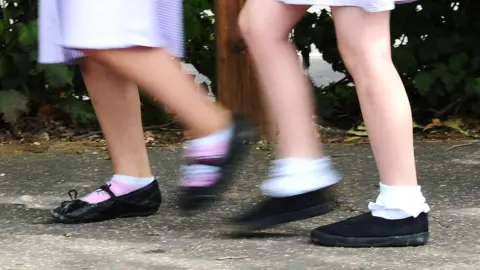The recent announcement regarding the government’s child poverty strategy has caused significant discussion within political circles. Originally slated for publication in the spring, the disclosure of this critical strategy has now encountered delays. The Child Poverty Taskforce, which is spearheading this initiative, is currently assessing various measures, including the contentious proposal to abolish the two-child benefit cap. This specific policy has been a long-standing target for criticism from Labour MPs, who argue that it exacerbates child poverty.
While the strategy’s formal release has been postponed, sources indicate that it may be revealed in the autumn, potentially coinciding with the Budget announcement. This timeline would offer the government an opportunity to clarify how any proposed changes to policies would be financed. Work and Pensions Secretary Liz Kendall has expressed her commitment to publishing the strategy, albeit cautioning the public to remain patient until it is fully formed.
The delay has drawn criticism from various political figures, particularly from the Scottish National Party (SNP). A senior source from Number 10 has attempted to mitigate concerns about the government’s commitment to tackling child poverty, highlighting ongoing initiatives such as the rollout of free breakfast clubs, adjustments to benefits, and increases in the minimum wage.
On the contrary, influential voices in the realm of child welfare have vocalized their discontent with the holdup. Kirsty Blackman, the SNP’s spokesperson on work and pensions, has condemned the delay as “disgraceful,” asserting that Labour’s leadership appears more preoccupied with political maneuvering than with addressing the pressing issue of rising child poverty. Dan Paskins, the director of policy at Save the Children UK, has also expressed concern, arguing that each month in limbo without action on the two-child limit exacerbates the plight of numerous children at risk of poverty.
Interestingly, some observers have suggested that a later publication may ultimately prove beneficial. Helen Barnard, policy director at the Trussell Trust, articulated this perspective in a social media post, suggesting that a delayed strategy that effectively mitigates hunger and hardship would be preferable to a rushed version lacking in substance.
Formed in July of the previous year, the Child Poverty Taskforce, co-chaired by both Kendall and Education Secretary Bridget Phillipson, emerged as a response to increasing pressure—both from within the Labour Party and external political entities—advocating for the consideration of scrapping the two-child benefit cap. This policy, which restricts most families from claiming means-tested benefits for third or any additional children born after April 2017, has continued to negatively impact families, with an estimated 1.5 million families affected nationwide.
Following Labour’s ascension to power last year, leaders indicated that immediate resources were inadequate to lift this cap. Sir Keir Starmer, the Prime Minister, previously articulated that no single measure could holistically resolve a multifaceted issue like child poverty. He emphasized the importance of devising a comprehensive strategy through the taskforce, reminiscent of approaches taken during previous Labour governments to address similar crises. Strikingly, tensions within the party have surfaced, evidenced by the suspension of seven Labour MPs for opposing the related government amendment. Although four were readmitted, others continue to serve as independents.
Furthermore, ongoing discussions within the Labour Party suggest a growing debate about how best to generate revenue and raise funds rather than implementing cuts to benefits. The political dynamics around these issues have intensified, especially following recent local elections reflecting the party’s waning popularity.
In summary, the government’s delay in publishing its child poverty strategy has sparked a myriad of responses, from criticism to cautious optimism. As the Child Poverty Taskforce continues its work, the outcome of this strategy’s future implementation will undoubtedly shape not only political discourse but also the lives of countless children across the nation grappling with the challenges of poverty.



